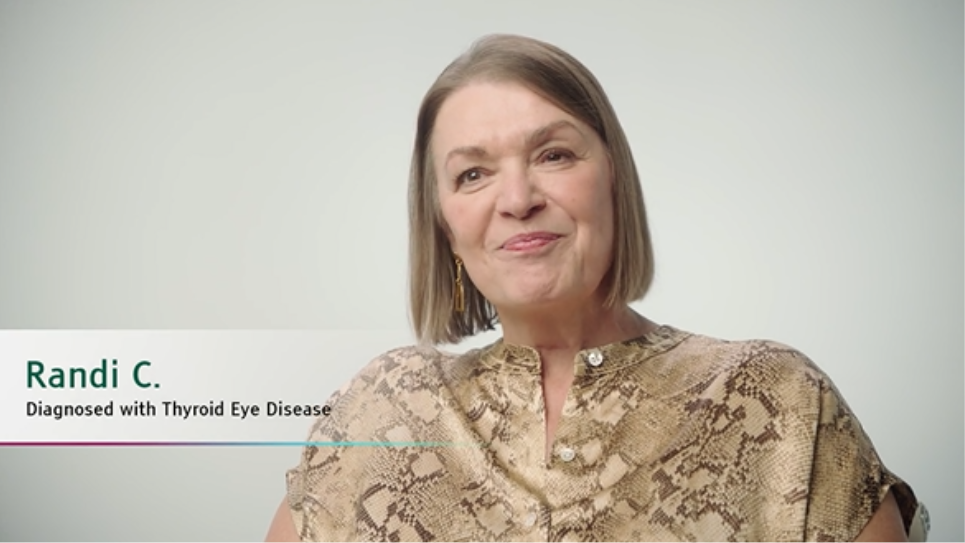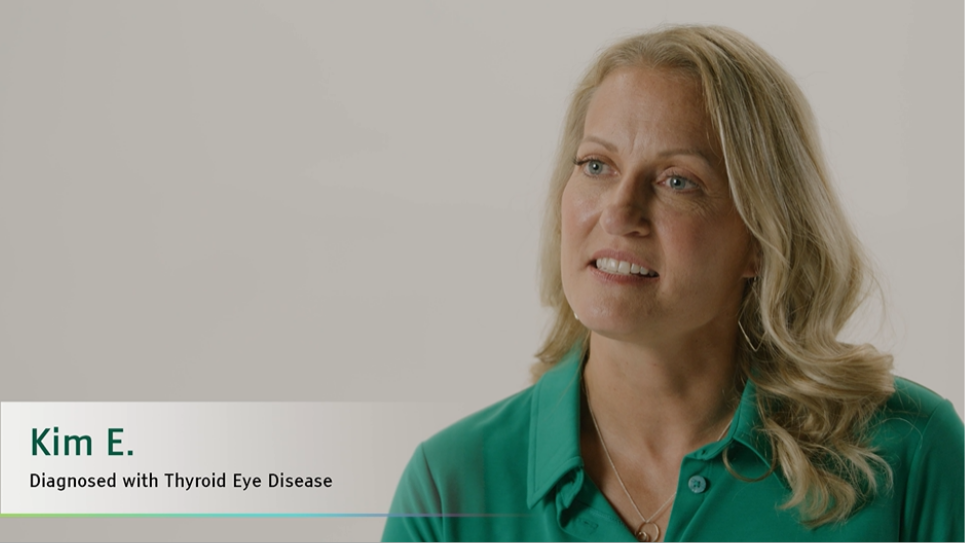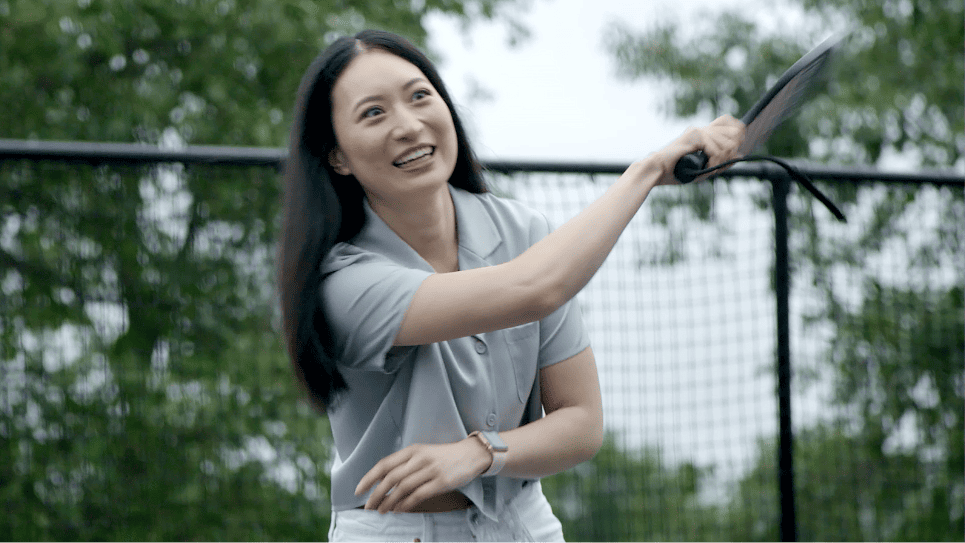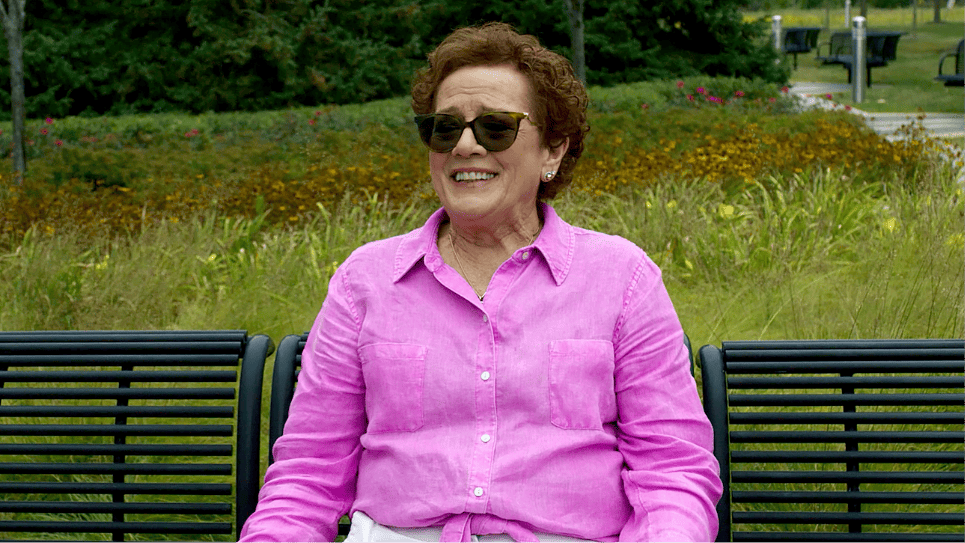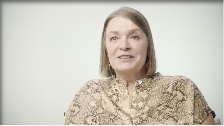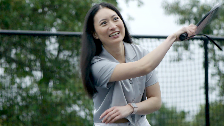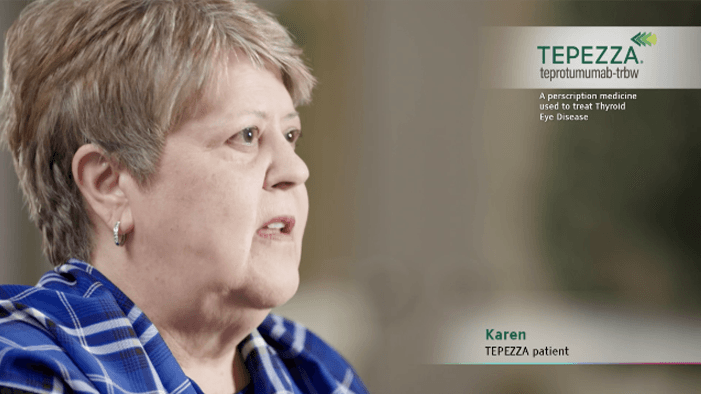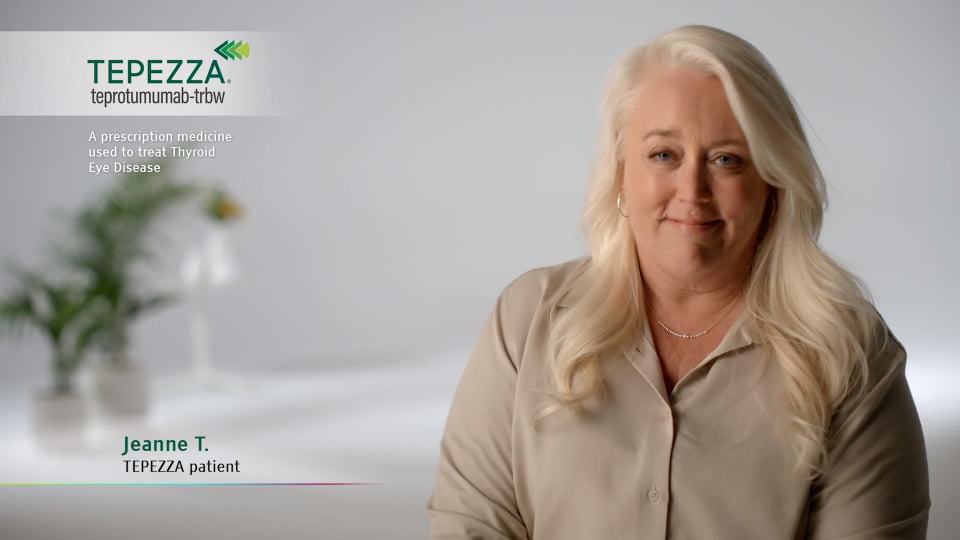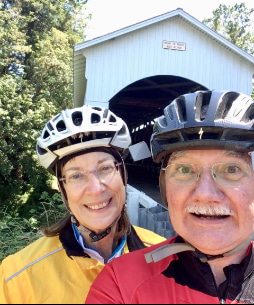*Playing pickleball
JASON: Hi, Lily.
LILY: Hi!
JASON: I love that we're catching up with you on the pickleball court.
LILY: I know. I'm very excited. It's really fun. I play tennis. I picked it up during COVID, so this is a lot easier to get the hang of.
JASON: So, what other things do you like to do when you're not playing tennis or now pickleball?
LILY: Yeah so, I also picked up Pilates recently, so that's really fun. I feel like it's a good low impact way you work out. But also hiking, cooking, and I also recently picked up skiing this year too, so I'm excited when skiing season starts in a few months to go down the slopes.
JASON: So, you're active, you do a lot of stuff.
LILY: Yeah. I think that's why, like when I was diagnosed, it was like really hard to stay active in the same ways that I did before.
JASON: Well Lily, how would you describe yourself to somebody who doesn’t know you?
LILY: Good question. I think I'm very lively, but I don't think you can see that when you first meet me. I think I'm definitely very calm and, just calm and kind I think, and positive.
JASON: I can see that because everything you say is said through a smile, so I think that checks out.
LILY: Yes, I think I need to stop smiling as much.
JASON: I disagree, I don't think anybody can ever say they should smile less.
LILY: Okay, okay. I'll take that.
JASON: How long have you been living with symptoms of Thyroid Eye Disease? When did it all start?
LILY: Yeah, so about two years ago, around, like, July 2021. I remember it was around the 4th of July, and I noticed, like, one of my eyes looked lopsided. The eyelid was a little higher than the other eye, and then this like, grittiness, bulging and like dryness and grittiness is very, very uncomfortable.
JASON: How long did it take when you started experiencing symptoms to when you were diagnosed?
LILY: It was really fast. I was like so scared. I was like, “Oh my gosh, what is wrong with me? I need to go to a doctor.” So, I went to the doctor and it only took about like a month or so before I was referred to my endocrinologist and she diagnosed me with like Graves’ disease, hypothyroidism and Thyroid Eye Disease.
JASON: How did your symptoms impact your ability to do those things you love to do?
LILY: Yeah, tremendously. I think like, light sensitivity is huge. Like, being able to like, go outside during the day and play. I was like, okay, like we can actually go. And then just like the dryness and grittiness, like watering of my eyes. They would like constantly water, it's hard to see the ball when your eyes are watering or things like that. It was hard to like work out when you wake up and like my eyes would get really swollen and puffy, like in the mornings and so, like, I would have to ice my eye rather than like, go out and like, be active and do things like that. So that part was really tough, just like the vision and being comfortable. Like be able to like, move my eyes too. I had like difficulty and pain moving my eyes. So like tracking the ball, obviously. You don't have as good a reflexes.
JASON: Yeah, I can imagine. So, at what point then, you know, as this is impacting your everyday life and you're you know, you're dealing with all of this, you've been diagnosed. When did doctors mention to you that there was treatment that could help?
LILY: My endocrinologist is awesome. She like mentioned it in the very first like consultation that I had, appointment with her. She was like, “There's this new drug, it’s TEPEZZA. It’s FDA approved and you seem like the perfect candidate for this.” So, I like knew at the outset like this was an option.
JASON: Did you have any concerns about going in? Did your endocrinologist shared possible side effects of treatment?
LILY: Yeah, I think I had like a few concerns, obviously, because I've never had an IV infusion, like it would obviously be something new. But the other symptoms, she was like very upfront with what was possible in terms of side effects. And after looking at them, I was like, these side effects, they're not worth like not doing the infusion. The side effects I was having from Thyroid Eye Disease were having a bigger impact on my life, and it was something that I was willing to go through with in order to feel better.
JASON: What kind of side effects did your endocrinologist tell you were possible?
LILY: She told me about high blood sugar, fatigue, muscle cramps, like hearing loss. The basic ones that you see when you go to the TEPEZZA website. And I wasn't too scared off by it. I think they were relatively reasonable. And I did my due diligence, looking into like what I was comfortable with and weighing the possibilities of like my own situation. And for me it was very worth it.
JASON: Did any of them stand out to you? Any of them concern you maybe more than the others?
LILY: Yeah, I think the ones that I can't control, like the ones with your body that happen, you can't control it, like your blood sugar if it goes up. You can obviously try to eat less sugar, but that's not something you can like actively do, like just not eat something and you'll be fine. But a lot of the symptoms, she told me that they will eventually slowly go away. And so, I think that was something that was like very reassuring to hear, they're not necessarily permanent. It's only like a little bit of pain in this amount of time for you to experience, like life as you know, again.
JASON: Over the course of treatment, did you experience any side effects?
LILY: I did. My biggest one was a rash on my arm where the infusion was, and we could never figure out whether it was from the infusion, from the materials used, the needle or any of the other tape or anything.
JASON: Did you have any of the cramping or anything with your hearing?
LILY: Yes. Yeah, I had muscle cramps in my legs and I remember the first time it happened, I thought it was because I went to hike the other day and I was like very sore and my leg was cramping. I was like, “Man, I am really out of shape from this hike, it wasn't even that long.” But then I realized, “Oh, like, this is actually one of the symptoms that my doctor told me about, and it's happening to me.” So, I connected like two and two together and realized, “Okay, this is what's happening.” I would have to like massage it, I would like wake up in the night from the pain. But that's only happened maybe like once every infusion or so. And then I also had some, like hearing changes. I had some like ringing in my ears. And then when I told my oculoplastic surgeon, he referred me to an audiologist to get a hearing test. And hearing test wise, like everything was fine and the ringing eventually ended after I stopped my infusion.
JASON: Was there ever a point where any of these symptoms make you question your decision to take TEPEZZA?
LILY: No, there wasn't a point in the treatment where I was like, I should stop this treatment because after like the second or third one, I started seeing improvements like very steadily. Where your eyes are, like how they feel and like your ability to like your peripheral vision, to move them around without pain and things like that, it was like very, very worth it.
JASON: As you ended up going through all eight treatments, when did you notice the biggest change? Was there a moment over the course of treatment that you're like, wow, I feel like, everything is improving?
LILY: I think after the fifth or sixth one, I feel like you can see a dramatic change in my, like, pictures from before and pictures now. I saw like a significant change. I was like, “This is really working. Like, okay, I just need to get through a few more.” Seeing the results and like going back and seeing your like before, after pictures is like worth all the effort and like pain that you suffered through. I was like, ““Okay, wait. I kind of look like myself again.” I was like, “Wait, this is how I’m supposed to look like. So, all the people who met me I'm like, “Okay, now you know me.” I was like “Okay, I'm very proud of myself. Like getting myself through all that and like, that's something I want to share with other people.” It feels like all the hard work is like finally paying off.
JASON: Did you say by the time you finished your eighth infusion, then all of the side effects had improved at that point?
LILY: So, I had them up like till my eighth infusion. And then once it finished, I gradually started noticing them like disappear. Once I stopped infusion, I didn't have any more like cramps, Like that wasn't a thing at all. And I didn't have any rash because I was only when I had the infusion. But the longest lasting one was the hearing changes. After a few months, okay, that slowly started going away. So, it was not permanent for me at all in any way.
JASON: When all was said and done and you've got your eight infusions and now the side effects have improved, your symptoms from TED have improved, what was that day like? After your eight infusion is done, did you celebrate in some way?
LILY: Okay, I got a cake and I was like, “Okay, I'm going to celebrate myself and eat the cake.” Right. And so I actually took a Polaroid like of the day when I finished the infusion. I have my cake to celebrate, but it was like, really, like, freeing to feel like, “Okay, like I'm done.” Especially since I don't like needles. So, every time I would get an infusion, it was like, very nerve wracking for me. Like my hands would sweat so, like no more needles, no more infusions, like no more treatments, and I'm getting better. So, it's like very celebratory. Thinking of all that you've done that whole six months of like getting the medicine was like, “Wow, if I can get there the six months of my life, I can get through like, any six months of my life.”
JASON: You share this story with a smile because you come out on the other side of this feeling better. But, what did you learn about yourself over the course of experiencing these symptoms and going through treatment to where you are today?
LILY: I think one thing there’s a lot more to smile about. I think during the course of my treatment it was pretty hard to smile or be positive or be happy about my future. It was hard to see that there was a light at the end of the tunnel during the process. But after on the other side of it, I realized, “Okay, yeah, there is a light at the end of the tunnel for that.” It was really hard for me to see that when I was in the process of it. I think I learned like I am a lot stronger than I thought I was, and a lot more capable of doing things that I don't know how to do, like navigating insurance or like trying to figure out what's happening with the infusion center. Like, “If I can do this, then like I can do anything” type thing.
JASON: I feel like I'm ready to take you on a pickleball. Are you willing to go challenge me out there?
LILY: Yes. Let's go.
JASON: Let’s go. Let’s go do it. Okay, I'll follow you.
*Playing pickleball
LILY: Awesome.
JASON: That’s great. Thank you so much for doing this.
LILY: No, thank you.
INDICATION AND IMPORTANT SAFETY INFORMATION
What is the most important information I should know about TEPEZZA?
Infusion reactions can happen during or within 24 hours after your infusion of TEPEZZA. If you have a reaction while receiving TEPEZZA, your doctor or nurse will slow or stop your infusion and treat your reaction. If you have a severe infusion reaction, your doctor may stop your treatment completely.
Tell your doctor or nurse right away if you have any of these symptoms during or after your treatment with TEPEZZA:
- High blood pressure
- Fast heartbeat
- Redness of the face/Feeling hot
- Difficulty breathing
- Headache
- Muscle pain
If you have inflammatory bowel disease (IBD), such as Crohn’s disease or ulcerative colitis, TEPEZZA may make your IBD symptoms worse. Symptoms of worsening IBD may include: an increased number of loose stools with stomach pain or cramps, and blood in your stools. After each TEPEZZA infusion, tell your doctor right away if you have worsening IBD symptoms.
TEPEZZA may cause an increase in your blood sugar. Before starting treatment with TEPEZZA, tell your doctor if you are currently being treated for diabetes, know your blood sugar is high, or have been diagnosed with diabetes. It is important for you to take your treatments and follow an appropriate diet for glucose control as prescribed by your doctor.
TEPEZZA may cause severe hearing problems including hearing loss, which in some cases may be permanent. Tell your doctor if you have any signs or symptoms of hearing problems or changes in hearing.
Before receiving TEPEZZA, tell your doctor if you:
- Have inflammatory bowel disease (Crohn’s disease or ulcerative colitis).
- Are currently being treated for diabetes, have been diagnosed with diabetes, or know your blood sugar is high.
- Are pregnant or plan to become pregnant. TEPEZZA may harm your unborn baby. Tell your doctor if you become pregnant or suspect you are pregnant during treatment with TEPEZZA.
- Women who are able to become pregnant should use an effective form of birth control (contraception) prior to starting treatment, during treatment and for at least 6 months after the final dose of TEPEZZA.
- Are breastfeeding or plan to breastfeed. It is not known if TEPEZZA passes into your breast milk. Talk to your doctor about the best ways to feed your baby during treatment with TEPEZZA.
- Tell your doctor about all the medicines you take, including prescription and over-the-counter medicines, vitamins, dietary and herbal supplements. Know the medicines you take. Keep a list of them to show your doctor and pharmacist when you get a new medicine.
What are the possible side effects of TEPEZZA?
The most common side effects of TEPEZZA include muscle cramps or spasms, nausea, hair loss, diarrhea, feeling tired, high blood sugar, hearing problems, taste changes, headache, dry skin, weight loss, nail problems, and changes in menstruation.
This is not a complete list of all possible side effects. Tell your doctor or treatment team about any side effect you may have.
You are encouraged to report negative side effects of prescription drugs to the FDA. Visit www.fda.gov/safety/medwatch, or call 1-800-FDA-1088.
Please visit TEPEZZA.com for more information.





